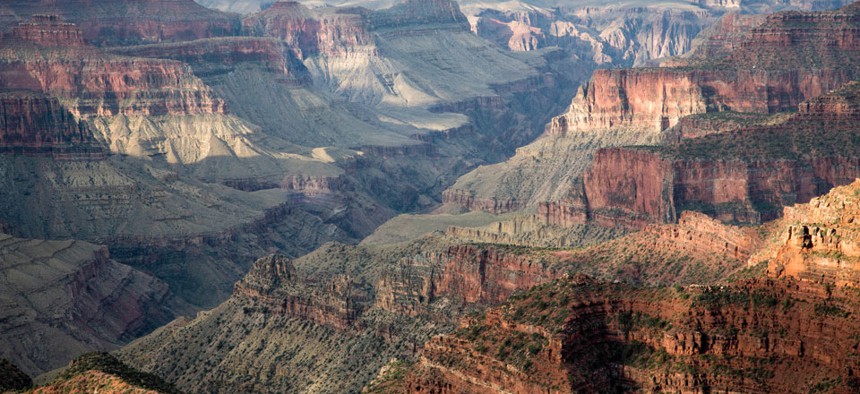
Grand Canyon National Park is among those opened with state funds. Rob van Esch/Shutterstock.com
States Shell Out Big Bucks to Open National Parks
For some, paying out of pocket without the guarantee of federal reimbursement is worth salvaging a lucrative tourism season.
Over the weekend, some nature lovers got the chance to wander the great federally funded outdoors again. Thanks to deals brokered with the federal government, some states dipped into their own cash to open their popular national parks, which closed its doors to visitors when the government shut down Oct. 1.
After a push from several governors, the Obama administration announced late last week that it would allow states to use their own money to pay for National Park Service operations. Shuttered parks were costing millions of dollars of revenue a day, state officials had argued. But keeping them open, even for just a week, isn't cheap. Still, for some states, salvaging a peak tourism season is worth it.
The decision is costing Utah the prettiest penny, at $1.67 million to keep five parks—Zion, Bryce, Arches, Canyonlands, and Capitol Reef, which opened Monday—running for 10 days. Next is Arizona, which will pay $651,000 dailoy to fund park operations at the Grand Canyon, which opened Saturday for at least a week. New York will pay $61,600 a day to finance the Statue of Liberty, which opened Sunday, until the shutdown ends. The governor's office had said more than 10,000 people were turned away each day that the popular site was closed.
Funding operations at Rocky Mountain National Park, which reopened on Saturday, will cost Colorado $362,700 for 10 days. Park operations at Mount Rushmore National Memorial will cost South Dakota $15,200 a day. The memorial saw 3,000 visitors when it reopened Monday, which state officials called average for a snowy October weekday.
For some Western states, however, opening their famous national parks is not an option. Wyoming "cannot use state money to do the work of the federal government," said a spokesperson for the governor. With the threat of default just days away, California officials said using state money to finance park operations is too risky. Nevada officials say the state can't afford to pay for parks because they're focused on budgets for food-stamp programs, unemployment insurance, and other needs.
A group of House members, including 14 Republicans and one Democrat, have proposed legislation that would require the federal government to reimburse states who opt to use their own money to run national parks during the shutdown. But with Washington now focused on the debt-ceiling deadline—and Senate Democrats' continuing disapproval of other similar House bills providing only partial funding—the bill has nowhere to go but congressional limbo.
(Image via Rob van Esch/Shutterstock.com)







